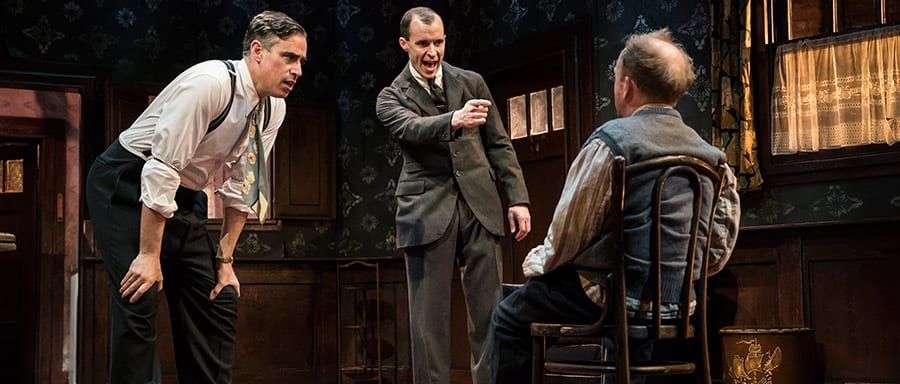It has been sixty years since The Birthday Party was met by a generally hostile London reception, but now the circumstances of its performance are utterly different: the play finds the recognition it has always deserved in Rickson’s production featuring a glittering cast.
The Birthday Party is set in a lodging house, run by the domesticated and somewhat ineffectual Meg (Zoë Wanamaker). The Quay Brothers, working on set design, have done well in creating a drab and altogether miserable scene. It is admittedly a neat home, but the faded and tearing wallpaper, as well as the rickety furniture, shows that it could do with some renovation. Meg’s other half is Petey (Peter Wight) who works as a deck chair attendant. The squat and unshaven Stanley (Toby Jones) is their only guest. The trio appear to lead a calm and sedentary life, something which is threatened by the arrival of the mysterious Goldberg (Stephen Mangan) and McCann (Tom Vaughan-Lawlor) who both represent a sinister ‘Organisation’. Lulu (Pearl Mackie) is a bubbly and vibrant neighbour of the lodging house who occasionally pops in; her costume is a marvellous floral number that lightens up the otherwise grey surroundings.

Stanley is the main focus of the play. During his birthday celebrations a pair of strangers come to whisk him away for unknown reasons. Toby Jones’s portrays an irascible and mysterious character, prone to mood swings and vacant pauses that show his damaged mind. Mangan balances this by bringing a great comedy element to the table with his volatility; inconsistencies bleed through his narratives, such as when he changes his own name halfway through stories or uses bizarre turns of phrase with conviction. But Mangan’s character can also be malicious, especially when he goads Stanley into a nervous breakdown.
The play elicits an unnerving sensation in us when we are incessantly forced to question what is real. Darkness seems central to Rickson’s production, such as when the lights (Hugh Vanstone is in charge here) are put off and only a torch is on, or when Stanley is blindfolded; there is definitely a comment about vision in what is seen and what is disguised. But we can cherish that chaotic space of doubt and division where nothing (or at most very little) is resolved. In fact, Pinter makes sure that questions about the provenance of these characters are even more perplexing at the end than at the beginning.
Fear is the residual emotion of The Birthday Party. We have no idea about what kind of gruesome exchange occurred between Goldberg and the visibly distraught Lulu in the night, but that all feeds back into the very nature of The Birthday Party: the beauty of this play is that open wounds remain open; the fear of uncertainty is what haunts us even after the curtain falls. We are filled with fear as a mute and deranged Stanley, indoctrinated into bureaucratic anonymity with the symbolic shackles of a suit and tie, is dragged offstage by Goldberg and McCann. This leaves Petey in the difficult bind of telling his wife that one person she holds special affection for has now ominously vanished, quickly bundled into the waiting motor car. Peter Wight does a good job at portraying a fatherly, protective figure, offering a last shred of advice to Stanley about never giving in as he is carted off by Goldberg and McCann.

